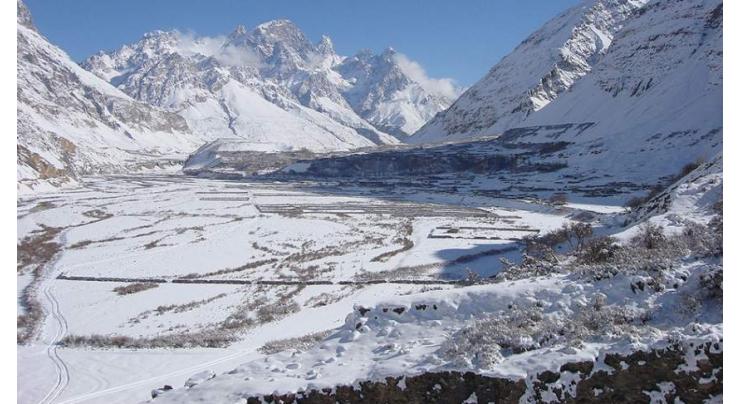
GLOF-II To Cover 15 Districts Benefiting 29 Million People
Mohammad Ali (@ChaudhryMAli88) Published July 19, 2019 | 06:22 PM

Glacial Lake Outburst Flood (GLOF) risk reduction project in Northern Areas of Pakistan (GLOF-II) will cover 15 districts benefitting around 29 million people in the region with the Green Climate Fund (GCF) funded US$ 37 million
Talking to APP, an official of the ministry of Climate Change (MoCC) said that Scaling-up of GLOF risk reduction in Northern Pakistan (GLOF-II) project was a continuation of the four years -Reducing Risks and Vulnerabilities from GLOF in Northern Pakistan"(GLOF-I)" project funded by Adaptation Fund.
He said that the GLOF-II was based on the measures piloted by GLOF-I and aimed at empowering communities to identify and manage risks associated with GLOFs. And also related impacts of climate change and improve community preparedness and disaster response, he added.
"GLOF-II will scale up GLOF-I from its original two districts (one each in Khyber Pakhtunkhwa (KP) and Gilgit Baltistan (GB)) to cover the 15 districts benefiting approximately 29 million people of the country," he said.
In response to the emergency, the official said at Hassan Abad due to surging of Shishper Glacier and formation of glacial lake the GLOF-II project had sponsored a joint mission of Pakistan Meteorological Department (PMD) and Gilgit Baltistan Disaster Management Authority (GBDMA). The combined mission comprised the experts of both the institutions to conduct feasibility and install Early Warning System (EWS), he added.
As a result, he said the EWS was installed there to avoid and reduce the impact of hazards such as flash floods created due to lake outbursts phenomenon.
In addition after launching of the project in GB and KP, implementation of activities was being facilitated as per the approved Annual Work Plan, he added.
To a question, he said by the end of the project at least 250 targeted engineering structures (check dams, mini dams, ponds, spillways, slope stabilization), 50 weather-monitoring stations (28 in GB and 22 in KP) and 408 river discharge gauges/sensors (238 in GB and 170 KP) would be installed enabling 100 per cent of households in targeted communities to receive and respond to early warnings and take the appropriate actions following the warning.
However, the procurement of necessary equipment for Provincial Disaster Management Authorities had been initiated which would strengthen their capacity to properly respond these kind of disasters, the official said.
Answering another question, he said, "The project has also initiated work on conducting important feasibility studies in order to identify the potential sites for installation of EWS and development of required infrastructure in order to reduce the vulnerability of local communities." MoCC and the United Nations Development Programme Pakistan in consultation with relevant provincial departments was closely working to make this first GCF project a success story and were committed to provide their full support to local communities within the project framework, he noted.
Related Topics
Recent Stories

Rock-solid Ruud racks up season-leading win in Barcelona

At UN, Iran says it will make Israel 'regret' reprisals

G7 hears calls for 'critical' Ukraine aid

EU seeks to leverage might to confront China, US challenge

5 Customs officials martyred as their vehicle ambushed by terrorists in D I Khan

Pak-New Zealand match called off due to rain

NHA restores traffic on roads affected by recent rains in Balochistan

China to fully support Pakistan's efforts against terrorism: Ambassador Jiang

U.S. envoy calls on Foreign Minister Ishaq Dar

Poland arrests man over suspected plan to kill Zelensky

EU wants to ease youth movement to and from UK

Police foils attempt of supply mainpuri raw material
More Stories From Pakistan
-

5 Customs officials martyred as their vehicle ambushed by terrorists in D I Khan
6 hours ago -

NHA restores traffic on roads affected by recent rains in Balochistan
6 hours ago -

China to fully support Pakistan's efforts against terrorism: Ambassador Jiang
6 hours ago -

U.S. envoy calls on Foreign Minister Ishaq Dar
6 hours ago -

Police foils attempt of supply mainpuri raw material
6 hours ago -

Govt making efforts to eradicate polio: DC
6 hours ago
-

Parliamentarians hail President's speech as reminiscent of state policy, rebuke Opposition's protest
6 hours ago -

Collective efforts to overcome challenges to education, say speakers at Int'l conference
6 hours ago -

RCB destroys 200 Kg of unhealthy meat
6 hours ago -

Turkish CGS calls on Army Chief, commends Pakistan Army's role in combating terrorism
6 hours ago -

CM directs to prepare wheat purchase plan for next season
7 hours ago -

Participants of management course of WAPDA Administrative Staff College meet Governor
7 hours ago











